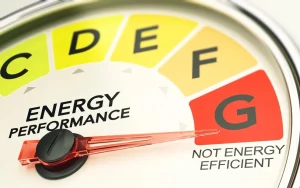New legislation mandates energy performance certificates (EPC) rating of C or higher for rental properties, necessitating upgrades to around 2.9 million privately rented homes. Savills, a prominent lettings and sales agency, estimates the total cost to landlords could reach £30 billion.
Presently, the minimum EPC requirement is E in England and Wales, planned to be raised to EPC C by 2028, though the timeline may be extended. Savills’ study indicates that more than half of the 5.7 million homes in the private rental sector may require upgrades, pending the implementation of these regulations.
Lucian Cook, head of residential research at the agency, emphasizes the significant challenge faced by the private rented sector, with landlords struggling to meet their expenses.
If the implementation schedule is delayed, it would relieve some immediate financial strain on landlords, allowing them to plan effectively. Nonetheless, existing mortgage costs and the conclusion of assured shorthold tenancies may prompt buy-to-let investors to reassess their positions, leading to limited supply and potential rent increases.

In 2021-2022, approximately 51% of the 728,138 EPC certificates issued for private rented sector (PRS) homes were below EPC level C, showing an improvement from 73% in 2016-2017. However, the primary concern lies with older housing stock, as around 71% of homes built before 1950 received EPC ratings below C, while only 12% of PRS properties constructed post-1995 require upgrades.
Savills’ analysis of EPC recommendations highlights the cost of fully upgrading properties to a maximum EPC C, ranging from £8,807 for a property currently rated EPC D to £27,366 for one with an EPC G rating.
“Securing funds for these necessary upgrades poses a challenge. While some low-cost options like energy-efficient lighting and heating thermostats have been widely adopted, the expenses associated with substantial upgrades like solar PV, solid wall, and solid floor insulation remain significant obstacles in many cases,” explains Cook.
“Notably, pre-war homes in the private rented sector require more extensive upgrades to achieve EPC C compliance. We assess that approximately 1.8 million such properties necessitate improvements, entailing an estimated investment of £22.5 billion, though the proposed cost cap will help reduce landlords’ actual financial exposure.”
Read more Property Investing News HERE
